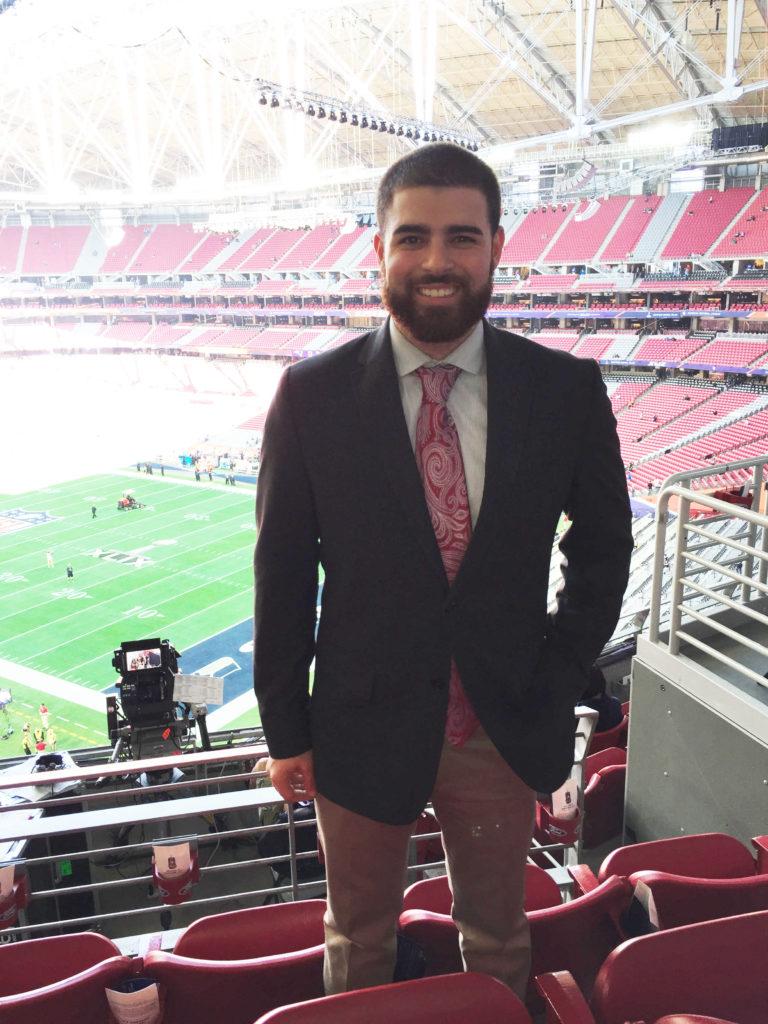By Sam Haas, news correspondent
While at Northeastern, 23-year-old Boston Globe sports correspondent Anthony Gulizia edited The Huntington News sports section, worked co-ops with The Globe and the Boston Bruins and covered the Red Sox during the 2013 World Series.
After graduating in the spring of 2014, the Revere native spent the next year on general assignment in The Globe’s sports section, reporting mostly on the New England Patriots, and was recently sent to cover Super Bowl XLIX in Glendale, Ariz.
In the months ahead, Gulizia hopes to become a staff writer at The Globe. The News spoke with him about his work as a reporter and how his Northeastern experience prepared him for a career in sports writing.
Huntington News: What was your time at Northeastern like?
Anthony Gulizia: I came in as an architecture major and bailed after two weeks. My sophomore year, I became sports editor at The Huntington [News]. It was the best experience I had in that it got me started. I wouldn’t have had any clips to give to The Globe; I wouldn’t have had anything at all.
HN: Was there anyone in particular who inspired you along the way?
AG: The people at The Globe have allowed me to learn from them. They’ve asked me questions and really helped me along the way. And everything I learned in the classroom at Northeastern helped me succeed when I was trying for real.
HN: How was working at the Super Bowl?
AG: You’re there for ten days and you’re writing a ton, I don’t even know how many stories. There’s a lot of things all at once—on Friday and Saturday, the team’s not available, so you have to make sure you get enough content and enough interviews stacked up earlier [in the week] so that you can write. You have to get to your people and ask them what you need to ask.
HN: How did you build relationships with players and with the team over a season?
AG: It just takes time, really. Guys are all different. Some of them like talking to people and some of them don’t. I don’t have any one particular person—there’s just certain guys you tend to gravitate towards more once you get a sense of whether they like talking to you or not.
HN: What parts of your personality make you a good sports writer?
AG: I like talking to people and I really like sports. I figured I’d try to put the two together. One of my biggest skill sets now is my versatility. I cover a lot of things for The Globe, whatever they need me to do, and I think that started from when I started working for The Huntington News. Not every assignment is going to be the Super Bowl, but you’ve still got a story to write.
HN: How do you separate the journalist from the fan?
AG: It’s pretty easy. It’s being professional, doing your job the way you’re supposed to. I never felt the urge to stand up and cheer. A lot of people are like, ‘Oh it’s so great you got to go to the World Series,’ [because] they think, as a fan, it’s great. But as a journalist, it’s a different feeling. It goes by fast because you’ve got work to do.
HN: What advice would you give to young journalists?
AG: In general, you have to say yes to everything. Never pigeonhole yourself. If [an editor] calls you and you’ve got plans, you drop your plans and go. Make it a point to make yourself invaluable. Use the people around you. They’ll tell you what’s going on, what to watch for. And no matter what you’re covering, it comes down to a few things: get information, talk to the right people and get the facts right.
HN: How can journalists use digital and multimedia content?
AG: Every journalist needs to be equipped. Your iPhone can do the job, take pictures and take videos. Social media can be your biggest asset—you can track people down, you can reach out to people and it works. I did a story a month ago about penalties and the Patriots. I tweeted at this former referee to ask a few questions, a stab in the dark. He followed me and sent me a direct message with his number. I just built a source from sending a tweet.
HN: What would you say to people who believe that journalism is a dying field?
AG: It’s not dying, but to say it isn’t changing would be naïve. People don’t pick up the newspaper anymore. You need to write for the Web, write shorter and faster, but don’t ever sacrifice the accuracy of a story just to get it up on time. I grew up doing it this way, so it’s just the way it’s going to be. It’s going to keep progressing.
HN: What are your goals for the year ahead?
AG: I want to latch onto a beat at The Globe. I’m part-time, so just like everyone else who’s graduated, I’m still looking for a full-time job.
Photo courtesy Anthony Gulizia









